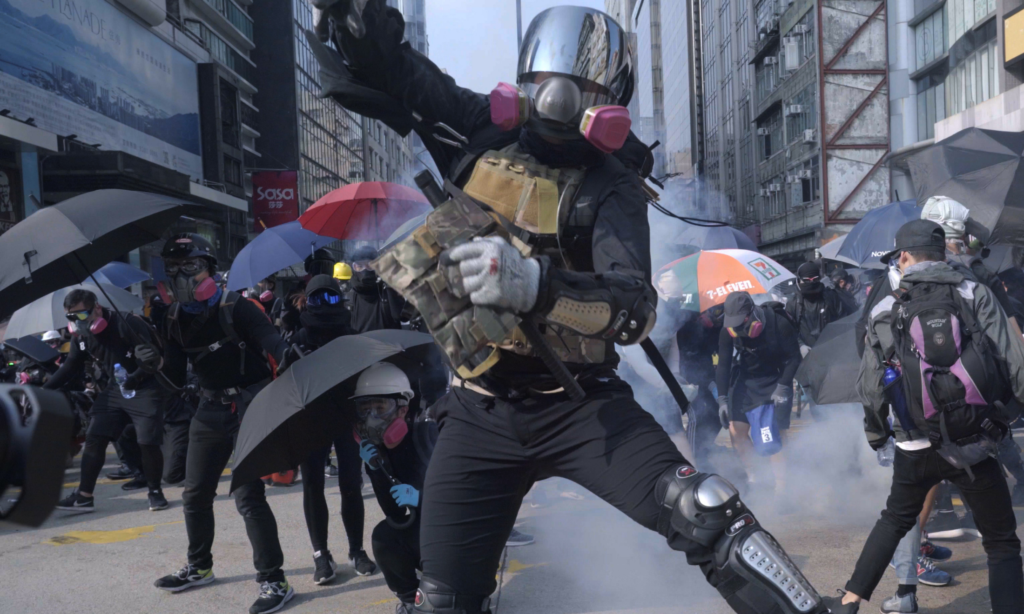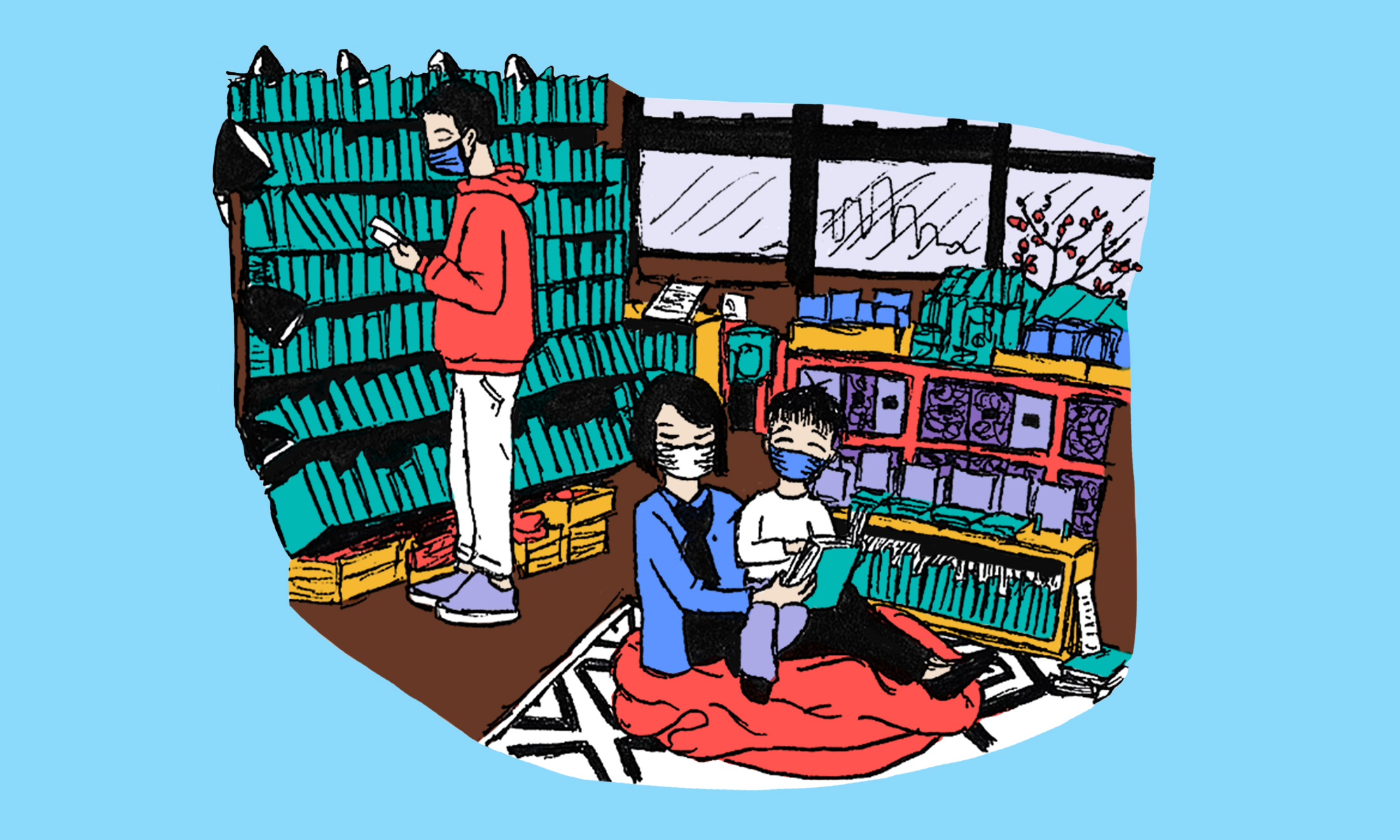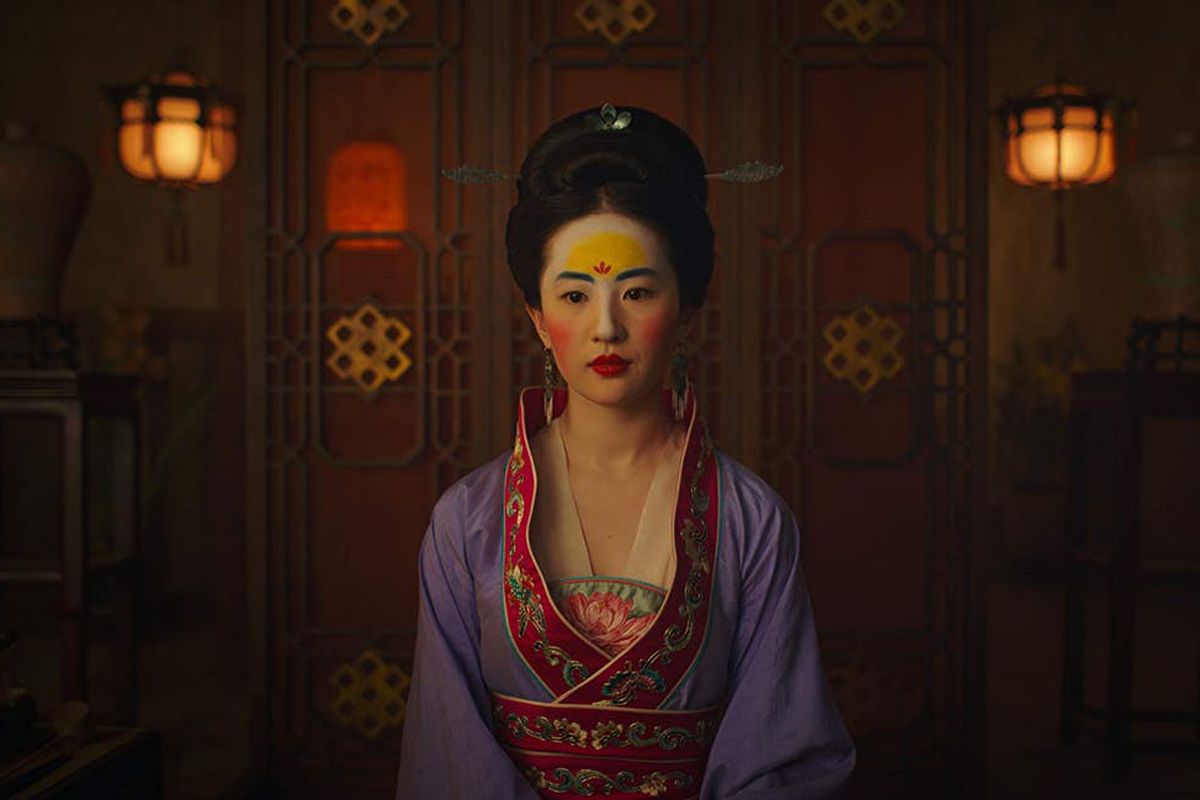
Uncle Chan from “Protect the Children”, still from 'Revolution of our Times', dir. Kiwi Chow
The unflinching Hong Kong protest film moving audiences to tears
'Revolution of Our Times' is the lead film at the UK’s first Hong Kong Film Festival, bringing Hongkongers closer together, and closer to home.
Suyin Haynes
23 Mar 2022
It was only a few minutes into the screening of Revolution of Our Times when Carmen Lau started crying. Sat alongside more than 500 viewers, mainly Hongkongers, in East London’s Genesis Cinema at the opening night of the Hong Kong Film Festival, the documentary about the 2019 pro-democracy protests brought back many memories and conflicting emotions for her.
“My tears just kept running. For the whole movie, there wasn’t any room for me to take a breath,” says 27-year-old Lau, a former district councillor in Hong Kong who moved to the UK last summer. Throughout the film, she saw events and protests that she had been present at, as well as her former colleagues featured on the screen; some of whom are now in jail due to Hong Kong’s National Security Law. “I’m not sure if it’s just the sense of homesickness, for me it was also a sense of regret. It’s a sense of feeling guilty that I was able to watch this film in the UK.”
The festival’s lead film, Revolution of Our Times, is a visceral, intense, and at times extremely distressing, timeline of the 2019-2020 protests. Clocking in at two and a half hours long, it’s assembled from news and video clips, interviews, and footage director Kiwi Chow shot himself during the protests. Revolution of Our Times has never screened commercially in Hong Kong due to concerns that it may violate the controversial National Security Law and sweeping new censorship laws that were introduced last October.
Yet it’s been a hit internationally, debuting at Cannes last year, breaking box office records in Taiwan, which faces similar challenges to its democracy and autonomy, and selling out cinemas in Vancouver, which is home to a large Hong Kong diaspora population. It was only fitting then, that it should serve as the opening night film for the inaugural Hong Kong Film Festival in the UK, taking place over the end of March and beginning of April, with tickets selling out almost immediately across locations in London, Bristol, Manchester and Edinburgh.
“My tears just kept running. For the whole movie, there wasn’t any room for me to take a breath”
Carmen Lau
As Hong Kong faces worsening political repressions as well as battling a devastating COVID-19 wave, the festival’s organisers hope to connect audiences in the UK with their home city through independent cinema with a selection of fiction films, shorts and documentaries, showing different layers, perspectives and multitudes of Hong Kong. “We resist by remembering, by not forgetting, by letting the rest of the world know what’s happening in Hong Kong, our ideas and imaginations,” said co-curator Ching Wong, introducing the opening screening of Revolution of Our Times.
With more than 103,000 Hong Kongers having applied to move to the UK since a new visa program was launched in January 2021, Wong hopes that the festival can serve as a point of connection for those newly arrived in the UK. “They are seeing their homeland through some distance, but at the same time are seeking connections,” she told gal-dem ahead of the opening night. “To watch a film about contemporary Hong Kong in Cantonese on a big screen, for people who may have been here for less than a year and may be experiencing some culture shock, is an empowering experience.”

Revolution of Our Times shows not only the physical scale and toll of the protests, but the mental impact too. Chow does not shy away from showing raw violence. Close-up shots of protesters zero in on their bleeding faces with wounds inflicted by rubber bullets, vomiting and crying from the suffocation of tear gas. Interviews in the film, from the elderly Uncle Chan desperate to protect younger protesters to the anonymous organisers responsible for mapping protest routes, demonstrate the great emotional and personal sacrifices protesters made to contribute to the movement, which called for five demands including withdrawal of a controversial anti-extradition bill and greater democratic freedoms. “It was such a historic moment that I wanted to capture the mood of the people involved,” says filmmaker Chow, who spoke to protesters from all walks of life, including one as young as 11 years old, participating in the protests surreptitiously without the knowledge of his parents.
“Revolution of Our Times shows not only the physical scale and toll of the protests, but the mental impact too”
Chow himself has received threats for making the film, and has had to tread carefully in his new artistic projects amid the current atmosphere of fear in Hong Kong. Shooting on set recently for his new project, a romance film, he says he was told he needed to write a report that there was no anti-government messaging involved before he could use a particular filming location. “This is how frightened people are at the moment,” he says. “[The government] said this censorship law is to keep Hong Kong safe, but in fact Hong Kong is moving backwards 20 to 30 years.” Yet while Chow is placing himself at great risk by continuing to speak out and show the film internationally, he remains resolute in staying in Hong Kong. “I believe one day, we will have our freedom back,” he says.
For Carmen Lau, watching the film alongside an audience comprised mainly of Hongkongers in London was like “an emotional release”. She was initially apprehensive, having seen two other documentaries following the movement – Taking Back the Legislature and Inside the Red Brick Wall (the latter of which features in the festival) – and feeling emotionally unsettled and upset afterwards. Yet while watching Revolution of Our Times was a difficult process, she felt like it eased a sense of homesickness and negative emotions towards Hong Kong, where authorities issued a warrant for her arrest last December, accusing her of inciting a poll boycott. “Watching it, I couldn’t believe that that’s what we’ve gone through, and it’s already been two years since,” says Lau, who now works for Hongkongers in Britain helping new arrivals settle in the UK. “2019 was just the beginning of Hong Kong being oppressed. What’s worse is what’s happening now.”
“I believe one day, we will have our freedom back”
Kiwi Chow
That sense of disbelief rang true too for Karlie Wu, a Glasgow-based artist of Chinese Hakka heritage who grew up visiting family and friends in Hong Kong regularly, and was based there in early 2019. For Wu, the experience of watching Revolution of Our Times brought the events of the protest movement closer to home, as did watching it alongside an audience with a shared and common understanding. “It’s one thing to see it on television alone, and to feel detached from everything that’s going on, but it’s another thing to be in a room full of people that for some, it means life or death,” she says.
Wu, who is a co-founder of Britain’s East and South East Asian Network (besea.n), is seeing more films through the festival period, including Reunification and Ballad on the Shore, the latter of which is set in a Hong Kong fishing village, reminiscent of her own father’s heritage. “Through these films, I can see other diasporans and individuals who feel the same things as me, and I feel more validated and reassured in my thoughts and opinions about Hong Kong and my background,” she says. “I think sometimes for diasporans, there can be a heavy sense of imposter syndrome, and through these films I feel a bit more comforted.”

That’s what the festival’s organisers are hoping for too. To narrate a story of Hong Kong that can speak to many different people in different ways, and will inspire audiences to explore Hong Kong cinema beyond well-known names like Bruce Lee and Wong Kar-wai. And beyond that, the act of organising such a festival without any commercial sponsorship and receiving such overwhelming demand, is a symbol of protest. “Even though we cannot transform the government directly, I think this memory and remembering is very important for resisting the hegemony of the authority,” says curator Wong. “When we insist on doing that, this ritual becomes resistance itself.”
Towards the end of Revolution of Our Times, one of the film’s interviewees and well-known Hong Kong bookseller Lam Wing-kee says Hong Kong as a place is not important – it’s Hongkongers who are. That sentiment rang true on opening night, as the final scene of the film depicted an orchestra all wearing masks to protect their identities, playing the protest anthem ‘Glory to Hong Kong’. Though the London cinema was geographically far away from Hong Kong, the spirit of defiance and protest felt palpable. It didn’t take long for the audience of the cavernous auditorium to simultaneously rise to their feet, sobbing and singing together in harmony.
The Hong Kong Film Festival runs until 5 April at locations across the UK.
Like what you’re reading? Our groundbreaking journalism relies on the crucial support of a community of gal-dem members. We would not be able to continue to hold truth to power in this industry without them, and you can support us from £5 per month – less than a weekly coffee.
Our members get exclusive access to events, discounts from independent brands, newsletters from our editors, quarterly gifts, print magazines, and so much more!









